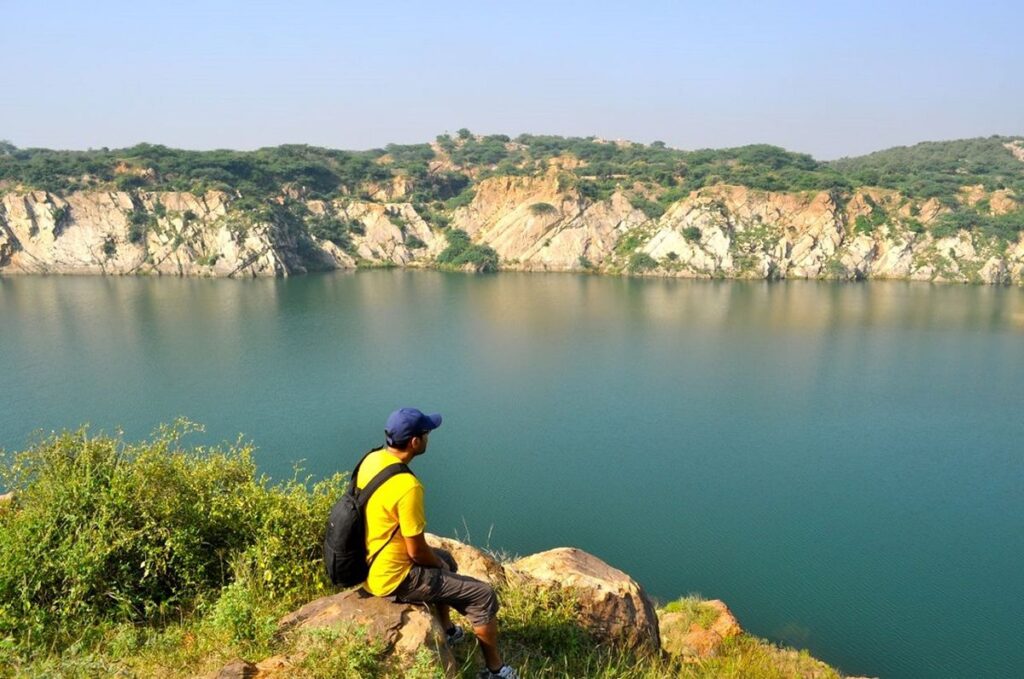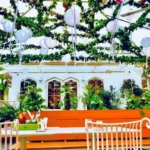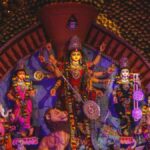Just an hour’s drive from Delhi’s bustling streets lies a hidden world where rocky hills embrace a crystal-blue lake — Bhardwaj Lake. Tucked inside the Asola Bhatti Wildlife Sanctuary, this scenic spot in the Aravalli Hills offers a refreshing escape for trekkers, photographers, and nature lovers.
Unlike Delhi’s more famous tourist destinations, Bhardwaj Lake isn’t crowded with souvenir shops or long queues. Instead, you’re greeted by chirping birds, rustling leaves, and the gentle glimmer of water reflecting the rugged cliffs.
In this blog, we’ll explore the lake’s origins, how to reach, what to expect, safety tips, and nearby attractions so you can plan the perfect day trip.
History & Formation of Bhardwaj Lake
While Bhardwaj Lake looks like a natural wonder, it’s actually the result of quarrying activity from decades ago. In the 1990s, this area was heavily mined for red sandstone and other minerals, leaving deep pits in the Aravalli Hills. Over time, these pits filled with rainwater and groundwater seepage, giving birth to multiple lakes — Bhardwaj being one of the largest.
Today, the lake sits inside the protected Asola Bhatti Wildlife Sanctuary, home to over 190 bird species, 80 butterfly species, and 20 mammal species including nilgai, jackals, and porcupines.
Getting There – A Quick Guide
Location: Asola Bhatti Wildlife Sanctuary, Tughlakabad, South Delhi
Distance from Central Delhi: ~25 km
Nearest Metro: Tughlakabad or Badarpur Border (Violet Line)
Best Route: From Tughlakabad metro, hire an auto or cab to reach the Asola Bhatti Wildlife Sanctuary entry point. The lake requires a short trek inside the sanctuary.
🚶 Trek Distance: ~4 km (moderate difficulty)
⏱ Trek Duration: 1.5 to 2 hours one way
Trekking to Bhardwaj Lake
The trail to Bhardwaj Lake offers a blend of rocky climbs, sandy stretches, and flat grasslands.
Key Highlights Along the Trek:
- Aravalli Ridges: Ancient rock formations dating back over 1.5 billion years.
- Flora: Dhau, babool, and keekar trees dominate the landscape.
- Bird Watching: Spot peafowls, partridges, and seasonal migratory birds.
💡 Pro Tip: Start your trek early in the morning to avoid harsh midday sun and enjoy cooler weather.
Best Time to Visit
| Season | Weather | Experience |
|---|---|---|
| Winter (Nov–Feb) | Pleasant 10–20°C | Best for trekking & photography |
| Monsoon (Jul–Sep) | Light showers, greenery | Lake looks most scenic |
| Summer (Apr–Jun) | Hot 35–45°C | Avoid midday; carry extra water |
What to Pack for Bhardwaj Lake Trip
- Comfortable trekking shoes
- 2–3 liters of water per person
- Sunscreen & cap
- Energy snacks (nuts, granola bars)
- Camera/binoculars for birdwatching
- First aid kit
Things to Do at Bhardwaj Lake
1. Photography Heaven
The contrast of turquoise water against rugged brown cliffs is a visual treat. Early mornings give the best light for reflection shots.
2. Birdwatching & Wildlife Spotting
Keep a safe distance from animals — you might see nilgai grazing or monitor lizards basking in the sun.
3. Nature Walks & Picnics
There’s no commercial food outlet inside, so carry your own snacks for a peaceful lakeside picnic.
Safety & Environmental Guidelines
Since Bhardwaj Lake is inside a wildlife sanctuary, respect these rules:
- No swimming or boating (depth is unknown, cliffs are steep).
- Avoid littering — carry your trash back.
- Stay on marked trails to avoid disturbing wildlife.
- Entry may require permission from the Forest Department — check before visiting.
Nearby Attractions
If you’ve made it to Bhardwaj Lake, you can explore more hidden and historical spots nearby:
- Asola Bhatti Wildlife Sanctuary Trails – Other lakes like Peacock Lake & Death Valley Lake.
- Tughlaqabad Fort – A medieval fort with panoramic city views.
- Surajkund – Known for its annual crafts mela and ancient reservoir.
- Qutub Minar – UNESCO heritage site about 40 minutes away.
Personal Experience – Why Bhardwaj Lake Stands Out
I still remember my first trek to Bhardwaj Lake. The path was dusty, the climb a bit tiring, but the moment I saw that shimmering blue water hidden between the barren hills, all fatigue vanished. It wasn’t just about reaching the lake — it was the silence, the wind, and the feeling that you’d stumbled upon a secret Delhi keeps from most tourists.
Conclusion – Delhi’s Natural Jewel
Bhardwaj Lake isn’t your typical tourist hotspot. It’s wild, raw, and untouched — a slice of nature that survived the city’s expansion. For those seeking tranquility, adventure, and a break from concrete life, this hidden lake is worth every step.
Nearest Metro: Tughlakabad (Violet Line) – then 20 min drive to sanctuary gate
Nearest Bus Stop: Dr. Karni Singh Shooting Range Bus Stop – 2 km from entry point



